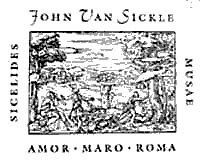
| teaching | Walcott | Virgil | mIndIng | poem books | garden/world | vita | |
| HOME > TEACHING >CORE CLASSICS (overview) |
| click on icons or titles to explore |
| essay assignments |
| e-mail:
jvsickle @brooklyn. cuny.edu |
|
What You Should Do When You
Write FORMAT: Double-space. Type. Make
margins 1.5 inches all around the page. Each &
every page must contain your name & the
page-number.
LENGTH: between four [4] and [9]
well-made paragraphs: paragraphs, not pages, are
the measure.
WHY PARAGRAPHS? to make you
consider what it takes to make a paragraph well &
how to make sure that each paragraph relates to what
goes before & follows it. On how to relate one
thing to another in writing, see further
below.
DEADLINE & REVISION:
essays handed in on time may be revised for higher
credit. Late essays lose one-half point per late class
day.
PURPOSE of ESSAYS: to practice
making an argument based on evidence from the readings
assigned for class. [Review the Protocol for
Reading]
Do not take material by others from
any source, including the
internet.
TO WRITE WELL, you will need
to do at least the
following:
>> decide on an idea or
argument you want to develop &
convey; >>
find evidence from assigned reading (not the internet)
to support your points [Review Protocol for Reading:
http://academic.brooklyn.cuny.edu/classics/jvsickle/csprotoc.htm]; >>
fit the evidence into a well-made narrative (paragraphs
& sentences); >>
present the evidence accurately with proper
credit. PROPER CREDIT & Format for
Quoting: when you quote evidence, you must identify its
source as follows: Homer
begins the Iliad with a prayer, "Sing,
goddess,...." (Iliad 1.1 [=Book 1, verse 1:
compare citation of "Chapter & verse" from sacred
texts]). WORDS
QUOTED must be set off by "quotation marks" &
their source must be credited so that the quotation can
be easily traced. In the above example, minimum
information appears for epic poetry: Title of work,
number of segment in the work ("book" or "chapter")
& numbers of any lines within the segment. For
prose, page numbers or section numbers will be
enough. CAUTION: never cite as follows: "Plato in
The Republic of Plato says that..."; rather you
should write "Plato says, in the Republic,
that..."; similarly,never write, "Homer in
The Iliad of Homer announces that "wrath" is his
main theme."; instead you must write as follows, "Homer
in the Iliad announces that "wrath" is his main
theme (Iliad. 1.1)." WHENEVER you use
material written by others, you must frame it &
identify it in this way: otherwise you commit
plagiarism & lose all credit for the
essay. PRACTICAL HINTS for WRITING. You may be
wondering, "How do I make a well-made paragraph?"
Paragraphs grow from sentences, which grow from
phrases, which are the parts of sentence & consist
of words grouped to convey ideas. Key phrases conveying
main ideas often open sentences, with explanation &
support added in. The explanation often continues in
further sentences, which should begin, then, with a
clear link to the ideas already introduced (for
example, ‘explanation’ at the head of this sentence
links with the previous sentence. Look at how ‘link’
gets used in what follows). If you are careful to link
sentences & paragraphs by means of key ideas, you
will be able to get & hold the attention of an
audience. Think of writing as telling a story so as to
hold the interest of an audience. Keeping the audience
in mind is a basic rule of effective speaking &
writing. FURTHER
HINT: whenever a word puzzles you, look it up to
see how it fits its context. Recommended: American
Heritage fourth edition. You can always earn a little
extra credit by showing how some difficult word really
fits in. [you may check my
vocabulary guide too] |
|
ATTENDANCE:
if you must be absent, tell me in advance (e.g., by
e-mail). Absence must be explained. Four unexplained
absences can exclude you from the
course.
GRADING
(approximate): 15 percent class participation; 30 percent essays; 25 percent midterm; 30 percent final.
back to top -----------------------------------------------------------------------------------------------------------------------------------------------------------------------------------
Professor John Van Sickle. [for resume, visit: http://academic.brooklyn.cuny.edu/classics/jvsickle/cv-02-02.htm]
Office:
Boylan 2404; Telephone: 718/951-5191 (secretary), ext. 5078 (office).
Hours:
Tuesday & Thursday 10:45-11:15, 3:00-3:30; or by appointment via e-mail (jvsickle@brooklyn.cuny.edu)
For course materials, check URL: http://academic.brooklyn.cuny.edu/classics/jvsickle/cslinks.htm
|
TIME CHART:click here for a short chart, to be filled by further reading.
Designed in Century fonts by JBVS ; started 96/01/03, revised 03/01/14.